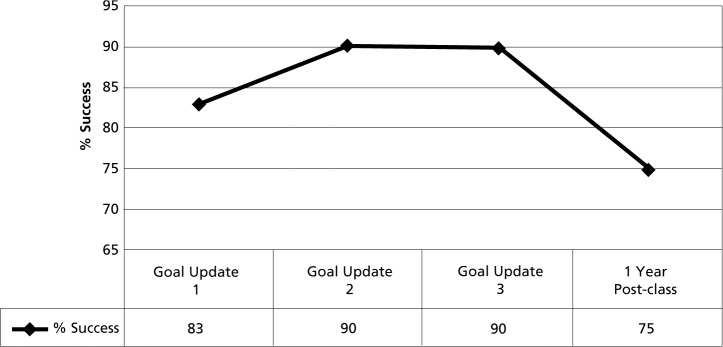Abstract
The Human Health Program at Emory University, Atlanta, Georgia, is an undergraduate curriculum that focuses on health in its broadest context, exploring novel strategies that educate, engage, empower, and encourage college students to develop and sustain healthy lifestyle behaviors. In the program, students take part in a onesemester experience that is a blend of academic health education and wellness coaching, where the group class supports a self-directed health goal process.
The Human Health Program at Emory University, Atlanta, Georgia, is an undergraduate curriculum that focuses on health in its broadest context, exploring novel strategies that educate, engage, empower, and encourage college students to develop and sustain healthy lifestyle behaviors. In the program, students take part in a onesemester experience that is a blend of academic health education and wellness coaching, where the group class supports a self-directed health goal process.
The class is run by an individual with education in the field of health/wellness and trained in wellness coaching methodologies. This role is a translation of the Predictive Health Partner role (similar to a wellness coach), taking a one-to-one interaction to a one-to-many group model.1 The Health Partner plays a key role in the academic delivery of health information as well as helping students break down barriers to making healthy choices, initiating behavior change by providing relevant resources, and facilitating the sharing of different perspectives in a group setting.
Each student completes a wellness self-assessment and creates a personalized Health Action Plan (HAP) based on personal priorities. The HAP includes a health/wellness vision and a highly individualized health goal with behavioral action steps. All goals fall into broad categories for health/wellness: mental, physical, social, emotional, or spiritual. The goal and action steps are revised three times during the process, sequentially incorporating educational content regarding self-assessed values, character strengths2,3 and “flow”4,5 activities.
Success rates for goal and action step achievement were self-rated by the students after each of the three revisions and 1 year after the class. The results described here are from a class conducted in the spring/summer of 2011. Fifty-two students (35 female and 17 male) ranging from 18 to 22 years of age were enrolled in the class (Figure).
Figure 1.

Median goal success percentages.
For the goal-setting process, the first and second median goal success rate (self-assessed) were 83% and 90%, respectively. The overall median final goal success rate was 90%. At 1-year follow-up, the reported median success rate for maintaining/sustaining initial behavior change was 75% (n=16).
The incremental increase in goal success rates seems to indicate that providing young adults with a comprehensive view of health while guiding them through a self-coaching process that builds intrinsic motivation and goal congruency may have a positive impact on health and well-being during this critical transition time in life. It is promising to see at 1 year post-class that the data suggest a high level of success with respect to sustaining initial goal behavior change.
Helping individuals discover and clarify their core values, understand their character strengths, and identify flow-generating experiences may encourage them to become engaged with their own well-being. Realigning health goals and supporting actions with these personal aspects has the potential to create great “a-ha” moments that empower individuals to actively stay healthy and optimize well-being, making them healthy by choice rather than by chance.
REFERENCES
- 1.Brigham KL. Predictive health: the imminent revolution in health care. J Am Geriatr Soc. 2010;58Suppl 2:S298–302 [DOI] [PMC free article] [PubMed] [Google Scholar]
- 2.VIA Institute on Character. [Accessed May 16, 2013]; http://www.viacharacter.org/www/
- 3.Linley PA, Nielsen KM, Gillett R, Biswas-Diener R. Using signature strengths in pursuit of goals: effects on goal progress, need satisfaction, and wellbeing, and implications for coaching psychologists. Internat Coaching Psychol Rev. 2010;5(1):6–15 [Google Scholar]
- 4.Csikszentmihalyi M. Flow: the psychology of optimal experience. New York: Harper Collins Publishers, Inc; 2008 [Google Scholar]
- 5.Bassi M, Delle Fave A. Adolescence and the changing context of optimal experience in time: Italy 1986-2000. J Happiness Studies. 2004;5:155–179 [Google Scholar]


